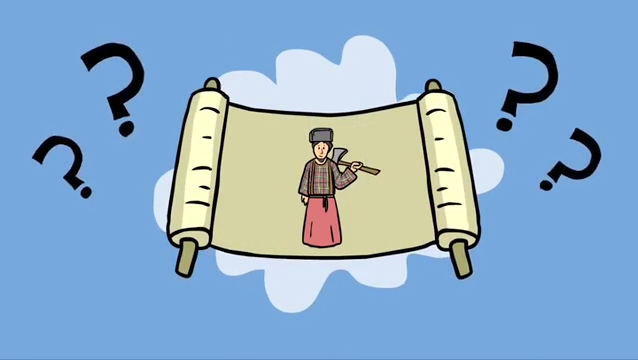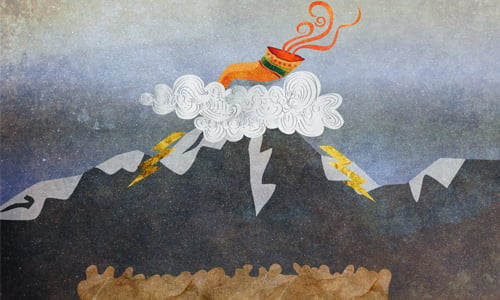Bonjour / Hello [nickname_else_first_name],
Table of contents
1) Perashat Hashavoua - Rabbi Eli Mansour
2) Halakhat Hashavoua (Halakhot related to day to day life) By Hazzan David Azerad -
The Reason for Eruv Tavshilin -Peninei Halacha
3) Holy Jokes!
4) For KIDS

This Week's Parasha Insight with Rabbi Eli Mansour
Parashat Nisavim- The “Cardiac Jew”
Parashat Nisavim continues Moshe’s warnings to Beneh Yisrael of the consequences of their failure to observe the Torah. After describing in great detail the catastrophes that God would bring upon them if they violate His laws, as we read in Parashat Ki-Tabo, Moshe now expresses concern that some among Beneh Yisrael will ignore his warnings: "Perhaps there is among you a man or woman…whose heart turns away this day from Hashem our God… When he hears these words of curse, he will bless himself in his heart, saying: All will be well with me for I shall follow my heart’s wishes…" (29:17-18).
Rav Tzvi Pesach Frank (1873-1961) offers a novel interpretation of this final phrase – "for I shall follow my heart’s desire" ("Ki Bi’shrirut Libi Elech"). The person that Moshe describes in these verses feels he can ignore the detailed laws of the Torah because he "follows his heart" – meaning, he is a good person, with a good heart and a fine character. He is polite, caring and sensitive, he deals honestly with people and treats them kindly. In this person’s mind, that is really all that God demands. God does not really care whether or not he puts on Tallit and Tefillin, and if or when he recites Berachot. Halachic details such as when he must stand or sit during prayer are entirely irrelevant, according to this line of thinking. What’s important is "Sherirut Libi" – having a good heart, being good-natured and kind.
God reacts angrily to this attitude, as Moshe warns in the next verse, "God will not agree to forgive such a person."
It goes without saying that the Torah demands a good heart. There is no question that we must be honest, courteous, caring and good-natured people, and that if we are not, then all our Misvot are worthless. Good character comes before all else. But we must never think that this is all God wants from us. We are bidden to follow all the laws He commands us, all four sections of the Shulhan Aruch. The Torah does not approve of the "cardiac Jew," the Jew who has a good heart and feels that this is all that is necessary. A good heart is indispensable but insufficient.
Imagine a CEO who hands his employee a list of twenty tasks that he needs completed by the end of the workday. At 5pm, the employee goes over to his boss to say hello. He very warmly asks how the boss’s day went, how his wife and children are, and shows genuine concern for the boss and his family. He even gives the boss a box full of treats and gifts for his children, and offers to paint his house for him, free of charge, as a kind gesture.
"Thank you, that’s very kind," the boss replies. "But before we get to that, what about the list of jobs I asked you to do today? Are they done?"
The employee replies that he hadn’t done any of them.
This worker sounds like a very nice man, with a heart of gold, who genuinely cares about people and likes doing favors, but he utterly failed as an employee. The boss certainly appreciates his kindness, but he demands much more – that the employee does what he’s told to do.
Hashem is our boss, and He has given us a list of jobs to do – all the Halachot in the Shulhan Aruch. We cannot pick and choose only those parts of Torah that naturally appeal to us and disregard the rest. We have been given the whole package, and we must always be committed to the whole package, so that God will approve of our "job performance" and continue "paying" us with His blessings.

Halachot this week are selected and Translated by Hazzan David Azerad
The Reason for Eruv Tavshilin -Peninei Halacha
When Shabbat follows Yom Tov, it is a mitzvah to set aside an eruv tavshilin before Yom Tov. Doing so makes cooking and baking on Yom Tov for Shabbat permissible. The eruv consists of food that is prepared before Yom Tov for Shabbat. It is called an eruv (literally “merging”) because it merges or joins the food of Yom Tov and the food of Shabbat. Once the eruv has been set aside, then just as it is permissible to bake and cook on Yom Tov for Yom Tov purposes, it becomes permissible to bake and cook on Yom Tov for Shabbat purposes as well. True, on the Torah level it is permitted to cook on Yom Tov for Shabbat even without an eruv, but the Sages prohibited doing so, to preserve the honor and dignity of both Yom Tov and Shabbat (Beitza 15b).
The honor of Yom Tov: The Sages were concerned that were it permissible to cook on Yom Tov for Shabbat unconditionally, people would also cook on Yom Tov for the upcoming week, thus transgressing a Torah prohibition. Therefore, the Sages permitted cooking on Yom Tov for Shabbat only for those who began the Shabbat preparation before Yom Tov by setting aside an eruv tavshilin. Then any preparation for Shabbat undertaken on Yom Tov is simply a continuation of what was begun before Yom Tov. Once people are aware that without an eruv tavshilin they may not cook on Yom Tov for Shabbat, they will realize that it is certainly prohibited to cook on Yom Tov for the upcoming week (R. Ashi’s opinion in the Gemara).
The honor of Shabbat: The Sages were concerned that because of the focus on preparing Yom Tov meals, people might forget that Shabbat was the next day, and would finish all the good food on Yom Tov. Therefore, the Sages required setting aside an eruv tavshilin before Yom Tov, which would help people remember Yom Tov to leave some good food for Shabbat (Rava’s opinion in the Gemara). Since an eruv tavshilin both honors Yom Tov and ensures that Shabbat will not be forgotten, it is a mitzvah for every Jew to set one aside.
One must make sure to complete cooking for Shabbat before shki’a on Friday so that in
theory, the food being cooked could be eaten on Yom Tov if unexpected guests drop by.
Bevikat Shabbat Shalom Umevorach
David Azerad
3) HOLY JoKeS!!
Selection of funny snippets, loosely related to this weeks parashah or current events, to brighten your day


4) FOR KIDS
Click on the image to open the youtube video













